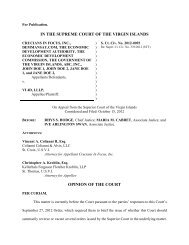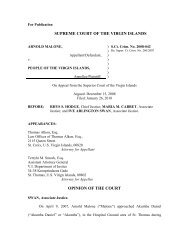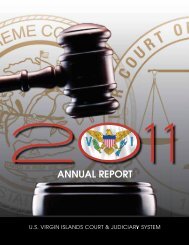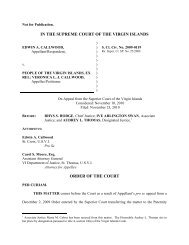IN THE SUPREME COURT OF THE VIRGIN ISLANDS OPINION OF ...
IN THE SUPREME COURT OF THE VIRGIN ISLANDS OPINION OF ...
IN THE SUPREME COURT OF THE VIRGIN ISLANDS OPINION OF ...
Create successful ePaper yourself
Turn your PDF publications into a flip-book with our unique Google optimized e-Paper software.
For Publication<strong>IN</strong> <strong>THE</strong> <strong>SUPREME</strong> <strong>COURT</strong> <strong>OF</strong> <strong>THE</strong> VIRG<strong>IN</strong> <strong>ISLANDS</strong>RICHARD A. JENSEN, ))Appellant/Plaintiff, ))v.))VIRG<strong>IN</strong> <strong>ISLANDS</strong> WATER AND POWER )AUTHORITY,))Appellee/Defendant. ))S. Ct. Civ. No. 2008-027Re: Super. Ct. Civ. No. 264/2005On Appeal from the Superior Court of the Virgin IslandsArgued: May 22, 2009Filed: December 10, 2009BEFORE:RHYS S. HODGE, Chief Justice; MARIA M. CABRET, Associate Justice; andIVE ARL<strong>IN</strong>GTON SWAN, Associate Justice.APPEARANCES:Natalie Nelson Tang How, Esq.St. Croix, U.S.V.I.Attorney for AppellantRochelle M. Bermudez, Esq.Assistant General CounselSt. Croix, U.S.V.I.Attorney for AppelleeHodge, Chief Justice.OP<strong>IN</strong>ION <strong>OF</strong> <strong>THE</strong> <strong>COURT</strong>Appellant Richard A. Jensen (hereafter “Jensen”) appeals from a March 17, 2008Superior Court order granting the Virgin Islands Water and Power Authority’s (hereafter“WAPA”) renewed motion to dismiss Count II of Jensen’s complaint. For the following reasons,we will vacate the Superior Court’s order and remand the matter for further proceedings.
Jensen v. WAPAS. Ct. Civ. No. 2008-027Opinion of the CourtPage 2 of 9I. FACTUAL AND PROCEDURAL BACKGROUNDJensen commenced employment with WAPA in 1994 and in 1998 was promoted to“Plant Electrician Supervisor,” a position covered by a collective bargaining agreement betweenWAPA and the Virgin Islands Workers’ Union, Local 611 (hereafter “Local 611”). During thecourse of his employment, Jensen had a history of disagreement with management on variousissues, which culminated in Jensen filing a Notice of Injury report in February 2001 with theDivision of Workmen’s Compensation in the Virgin Islands Department of Labor, after hisphysician had diagnosed him with job-related anxiety and depression. After Jensen attempted toresume his employment after his disability ended, WAPA, in a letter dated October 10, 2001,terminated his employment as of October 19, 2001.Jensen filed suit against WAPA in the District Court of the Virgin Islands on October 17,2003, asserting causes of action for 1) violation of the Family Medical Leave Act; 2) violation ofthe National Labor Relations Act; 3) deprivation of civil rights pursuant to 42 U.S.C. §§ 1983and 1985; 4) violations of due process rights and his First Amendment right to free speech; 5)age discrimination pursuant to 10 V.I.C. § 64; 6) violation of the mandatory rehiring provisionsof the Workmen’s Compensation Statute, 24 V.I.C. § 285; 7) intentional infliction of emotionaldistress; and 8) negligent infliction of emotional distress. On April 1, 2005, the District Courtdismissed Jensen’s complaint after it held that he could not establish the elements of the federalcauses of action and declined to exercise supplemental jurisdiction over claims based on VirginIslands law.On May 5, 2005, Jensen re-asserted his territorial law claims against WAPA in theSuperior Court, alleging causes of action for 1) age discrimination pursuant to 10 V.I.C. § 64; 2)violation of the mandatory rehiring provisions of Workmen’s Compensation Statute, 24 V.I.C. §
Jensen v. WAPAS. Ct. Civ. No. 2008-027Opinion of the CourtPage 4 of 9was timely filed. See V.I.S.CT.R. 5(a)(1) (“[T]he notice of appeal required by Rule 4 shall befiled with the Clerk of the Superior Court within thirty days after the date of entry of thejudgment or order appealed from . . . ”).The standard of review for this Court’s examination of the Superior Court’s applicationof law is plenary, while the Superior Court’s findings of fact are reviewed for clear error. St.Thomas-St. John Bd. of Elections v. Daniel, 49 V.I. 322, 329 (V.I. 2007).B. The Nature of a Retaliatory Discharge ActionPursuant to Virgin Islands law, a litigant must commence a tort action within two years ofthe date the claim accrues, but has six years to initiate proceedings to recover for breach ofcontract. 5 V.I.C. § 31 (1997). Accordingly, before considering Jensen’s contention that thetrial court erred in dismissing his retaliatory discharge claim as time-barred, it is necessary forthis Court to determine whether such an action sounds in tort or contract. See Arlington FundingServs., Inc. v. Geigel, S.Ct. Civ. No. 2008-007, 2009 WL 357944, at *4 (V.I. Feb. 9, 2009).The Virgin Islands Code provides that, in the absence of local laws or a Restatementprovision to the contrary, “[t]he rules of the common law . . . as generally understood andapplied in the United States, shall be the rules of decision in the courts of the Virgin Islands incases to which they apply. . . .” 1 V.I.C. § 4 (1995). This Court has previously held that thisstatute “‘is impressive evidence that the Virgin Islands legislature intends [majority] rule togovern in the absence of specific legislation.’” Robles v. HOVENSA, LLC, 49 V.I. 498-99 (V.I.2008) (quoting Dyndul v. Dyndul, 541 F.2d 132, 134, 13 V.I. 376 (3d Cir. 1976)). Althoughcourts are split as to whether a retaliatory discharge claim sounds in tort, contract, or both, a clearmajority of jurisdictions addressing the issue have characterized retaliatory discharge as a tort
Jensen v. WAPAS. Ct. Civ. No. 2008-027Opinion of the CourtPage 5 of 9action. 1 “A breach of contract may be said to be a material failure of performance of a dutyarising under or imposed by agreement. A tort, on the other hand, is a violation of a dutyimposed by law, a wrong independent of contract. Torts can, of course, be committed by partiesto a contract.” Malone v. Univ. of Kansas Me. Ctr., 552 P.2d 885, 888 (Kan. 1976).Consequently, “[t]he question to be determined here is whether the actions or omissionscomplained of constitute a violation of duties imposed by law, or of duties arising by virtue ofthe alleged expressed agreement between the parties.” Id. However, a cause of action forretaliatory discharge, by its very nature, “aris[es] from a breach of public policy dutiesindependent of the employment contract.” Tiede v. CorTrust Bank, N.A., 748 N.W.2d 748, 7521 Compare Holland v. Hardee’s Food Systems, Inc., 853 F. Supp. 848, 850 (E.D. Pa. 1994) (holding that retaliatorydischarge is a tort claim); Gonzales v. City of Mesa, 779 F. Supp. 1050, 1052-53 (D. Ariz. 1991) (same); Batey &Sanders, Inc. v. Dodd, 755 So.2d 581, 583 (Ala. Civ. App. 1999) (same); Meyer v. Byron Jackson, Inc., 207Cal.Rptr. 663, 670 (Cal. Ct. App. 1984) (same); Martin Marietta Corp. v. Lorenz, 823 P.2d 100, 116 (Colo. 1992)(same); Pucci v. American-Republican, No. 118491, 1994 WL 235316, at *3 (Conn. Super. Ct. 1994) (same); Byrdv. Voca Corp. of Washington, D.C., 962 A.2d 927, 933-34 (D.C. 2008) (same); Stebbings v. Univ. of Chicago, 726N.E.2d 1136, 1140 (Ill. App. Ct. 2000) (same); Holtz v. Bd. of Commrs. Of Elkhart County, 560 N.E.2d 645, 646(Ind. 1990) (same); Conaway v. Webster City Products Co., 431 N.W.2d 795, 798 (Iowa 1988) (same); Murphy v.City of Topeka-Shawnee County Dept. of Labor Services, 630 P.2d 186, 190 (Kan. Ct. App. 1981) (same); FirestoneTextile Co. Div., Firestone Tire and Rubber Co. v. Meadows, 666 S.W.2d 730, 733 (Ky. 1983) (same); Autrey v.Energy Corp. of America, Inc., 594 So.2d 1354, 1358 (La. Ct. App. 1992) (same); Ghorbanni v. North DakotaCouncil on Arts, 639 N.W.2d 507, 510 (N.D. 2002) (same); Hartbarger v. Frank Paxton Co., 857 P.2d 776, 783 n.5(N.M. 1993) (same); Phillips v. Butterball Farms Co., Inc., 531 N.W.2d 144 (Mich. 1995) (same); Abraham v.County of Hennepin, 639 N.W.2d 342, 352 (Minn. 2002) (same); Pratt v. Purcell Tire and Rubber Co., Inc., 846S.W.2d 230, 232 (Mo. Ct. App. 1993) (same); Gates v. Life of Montana Ins. Co., 668 P.2d 213, 214-15 (Mont.1983) (same); Hansen v. Harrah’s, 675 P.2d 394, 397 (Nev. 1984) (same); Zachary v. State ex rel. Dep’t. ofCorrections, 34 P.3d 1171, 1173 (Okla. Civ. App. 2001) (same); Dunwoody v. Handskill Corp., 60 P.3d 1135, 1138(Or. Ct. App. 2003) (same); Ludwick v. This Minute of Carolina, Inc., 337 S.E.2d 213, 216 (S.C. 1985) (same);Roberts-Deckard v. City of Sevierville, No. E2008-01580-COA-R3-CV, 2009 WL 1409981, at *5-*6 (Tenn. Ct.App. May 20, 2009) (same); Midland Independent School Dist. v. Watley, 216 S.W.3d 374, 382 (Tex. App. 2006)(same); Harless v. First Nat. Bank in Fairmont, 289 S.E.2d 692, 699 (W.Va. 1982) (same); Allen v. Safeway Stores,Inc., 699 P.2d 277, 284 (Wyo. 1985) (same) with Eldridge v. Felec Services, Inc., 920 F.2d 1434, 1437 (9th Cir.1990) (applying Alaska law to hold that retaliatory discharge is a contract claim); Reed v. Municipality ofAnchorage, 782 P.2d 1155, 1158 (Alaska 1989) (holding that retaliatory discharge is a contract cause of action);Sterling Drug, Inc. v. Oxford, 743 S.W.2d 380, 385 (Ark. 1988) (same); Brockmeyer v. Dun & Bradstreet, 335N.W.2d 834 (Wis. 1983) (same). See also Pierce v. Ortho Pharmaceutical Corp., 417 A.2d 505 (N.J. 1980) (statingthat retaliatory discharge may sounds in either tort or contract).
Jensen v. WAPAS. Ct. Civ. No. 2008-027Opinion of the CourtPage 6 of 9(S.D. 2008) (emphasis added). Moreover, the gravamen of Jensen’s complaint rests not withWAPA’s alleged failure to comply with a specific contractual obligation, but with its purportedviolation of the workers’ compensation statutes’ re-hiring provisions. 2Accordingly, this Courtadopts the reasoning adopted by a majority of jurisdictions and holds that the Superior Court didnot err 3 in applying the two-year statute of limitations for tort actions to Jensen’s retaliatorydischarge claim. 4C. Tolling of the Statute of LimitationsIn both its July 22, 2005 opinion and March 17, 2008 order, the Superior Court, relyingon Brennan v. Kulick, 407 F.3d 603, 606-07 (3d Cir. 2005), held that none of Jensen’s causes ofactions were tolled during the pendency of the District Court action because “[t]he filing of acomplaint subsequently dismissed does not toll the statute of limitations.” Jensen, however,contends that dismissal on such a basis was improper because the Superior Court did not applythe correct test to determine whether tolling is appropriate. We agree.Since Jensen first asserted his territorial law claims in his District Court complaint, and2 Because neither party has raised these issues on appeal, it is neither necessary nor proper for this Court to reviewthe correctness of the Superior Court’s decision to re-characterize Count II of Jensen’s complaint as a cause ofaction for retaliatory discharge, see Restatement (Second) of Torts § 874A (authorizing courts to allow litigants,under certain circumstances, to pursue tort actions for violations of statutory provisions), or to determine whether alitigant must pursue the administrative remedies provided in section 285 of title 14 prior to filing suit for retaliatorydischarge. See St. Thomas-St. John Bd. of Elections v. Daniel, 49 V.I. 322, 328 n. 8 (V.I. 2007).3 Although Jensen contends that the law of the case doctrine precluded the Superior Court from purportedlycontradicting its July 22, 2005 opinion in its March 17, 2008 order—which had been issued by a different trialjudge—this Court declines to reverse the Superior Court on such a basis because the nature of a retaliatory dischargeclaim is a pure question of law that is subject to de novo review by this Court. See Hodge v. McGowan, S.Ct. Civ,No. 2007-057, 2008 WL 4924628, at *8 (V.I. 2008) (declining to reverse grant of partial summary judgment byjudge who should have recused himself because de novo review of summary judgment order on appeal cured anyerror by granting plaintiff “the same consideration she would receive if [the] order was vacated and remanded for anew trial on the motion for partial summary judgment.”).4 Because Jensen is precluded from pursuing his retaliatory discharge cause of action under a contract theory, andWAPA has not argued that the LMRA preempts Jensen’s tort claim, it is not necessary for this Court to considerWAPA’s argument that Jensen’s action cannot proceed without running afoul of the LMRA’s preemptionprovisions.
Jensen v. WAPAS. Ct. Civ. No. 2008-027Opinion of the CourtPage 7 of 9argued that the District Court had supplemental jurisdiction over those claims due to theirrelationship to his federal causes of action, the District Court’s refusal to exercise supplementaljurisdiction after dismissing his federal claims compelled Virgin Islands local courts to toll thestatute of limitations on those causes of action “while the claim[s] [are] pending and for a periodof 30 days after [they] are dismissed.” 28 U.S.C. § 1367(d). See also Jinks v. Richland County,S.C., 538 U.S. 456, 462-63, 123 S.Ct. 1667, 155 L.Ed.2d 631 (2003) (explaining purpose behind28 U.S.C. § 1367(d) and affirming its constitutionality). 5 Therefore, Jensen was, at a minimum,entitled to have the statute of limitations on his retaliatory discharge claim tolled from October17, 2001 through May 2, 2005, 6 with an additional credit for the two days remaining on the twoyearstatute of limitations at the time the District Court complaint was filed. 7Accordingly,Jensen’s Superior Court action would have unquestionably been timely had it been initiated on orbefore May 4, 2005.Jensen, however, did not file his Superior Court complaint until May 5, 2005.Nevertheless, the Superior Court erred in dismissing Jensen’s complaint solely on this basiswithout performing an equitable tolling analysis. Although the Superior Court is correct that theUnited States Court of Appeals for the Third Circuit held in Brennan that, for purposes of federal5 Furthermore, it is arguable that Jensen would have been entitled to a thirty day post-dismissal tolling period evenin the absence of this federal statute. Cf. Morin v. Massachusetts, 598 F.Supp.2d 165, 167 (D. Mass. Feb. 20, 2009)(explaining that limitations period to file habeas petition in federal court cannot run from date of final state courtorder, but runs from date time to file notice of appeal with higher state court has expired).6 Although the District Court dismissed Jensen’s federal claims and declined to exercise supplemental jurisdictionover Jensen’s territorial law causes of action in an April 1, 2005 order, Jensen was entitled to tolling until May 2,2005 because May 1, 2005 fell on a Sunday. See 1 V.I.C. § 171(c) (“Whenever any act is appointed by law . . . to beperformed upon a particular day, which day falls upon a holiday, that act may be performed upon the next businessday with the same effect as if it had been performed upon the day appointed.”); 1 V.I.C. § 171(a) (“The followingdays are legal holidays in the Virgin Islands . . . [e]very Sunday.”).7 The parties do not dispute that Jensen’s claim accrued on October 19, 2001, the date his employment wasterminated.
Jensen v. WAPAS. Ct. Civ. No. 2008-027Opinion of the CourtPage 8 of 9law, a complaint dismissed without prejudice by a district court cannot toll the statute oflimitations, the Third Circuit has also expressly held that Virgin Islands local law differs fromfederal law in that it does allow a trial court to equitably toll the statute of limitations if:(1) the first action gave defendant timely notice of plaintiff's claim; (2) the lapse oftime between the first and second actions will not prejudice the defendant; and (3)the plaintiffs acted reasonably and in good faith in prosecuting the first action, andexercised diligence in filing the second action.Island Insteel Sys., Inc. v. Waters, 296 F.3d 200, 218 (3d Cir. 2002) (citing Hosogai v. Kadota,700 P.2d 1327 (Ariz. 1985)). Consequently, the Superior Court erred in dismissing Jensen’sretaliatory discharge cause of action 8 based on an incorrect application of federal law to theexclusion of Virgin Islands local law. 9This Court, however, is unable to determine, based on the present record, whether Jensenis entitled to equitable tolling. As the Island Insteel court recognized, the equitable tolling test ishighly “fact-specific” and thus “application of this equitable doctrine is generally committed tothe discretion of the trial court in the first instance.” Id. at 218. Notably, the record iscompletely silent as to whether Jensen exercised diligence in bringing the second action—particularly given that Jensen was already entitled to statutory tolling pursuant to 28 U.S.C. §1367(d)—and whether WAPA suffered any prejudice as a result of the lapse of time between the8 Although the Superior Court may have also erred in dismissing Counts I, III, and IV of Jensen’s as time-barred,this Court shall not reverse the trial court’s decision on those counts because Jensen has only challenged dismissal ofhis retaliatory discharge cause of action on appeal. See Bernhardt v. Bernhardt, S.Ct. Civ. No. 2007-132, 2009 WL1077925, at *3 (V.I. Apr. 17, 2009) (explaining that issues not raised on appeal or argued in the appellant’s brief arewaived).9 Although the original complaint in Island Insteel Systems had been dismissed for lack of personal jurisdiction, thesame equitable tolling rule applies when a complaint is dismissed for any reason not related to the merits. SeeWilliams v. Tutu Park Ltd., No. 2006-40, 2009 WL 971398, at *2 (D.V.I. App. Div. Apr. 3, 2009) (holding thatIsland Insteel Systems test applies to dismissal for lack of subject matter jurisdiction). Here, although the DistrictCourt’s decision to dismiss Jensen’s territorial law claims is not equivalent to a dismissal for lack of subject matterjurisdiction, Carlsbad Tech., Inc. v. Hif Bio, Inc., --- U.S. ---, 129 S.Ct. 1862, 173 L.Ed.2d 843 (May 4, 2009), theIsland Insteel Systems test nevertheless applies because dismissal of those claims was not related to the merits ofJensen’s non-federal actions.
Jensen v. WAPAS. Ct. Civ. No. 2008-027Opinion of the CourtPage 9 of 9two actions. Accordingly, this Court shall vacate the Superior Court’s March 17, 2008 order andremand the case to the Superior Court so that it may perform a proper tolling analysis.III. CONCLUSIONSince a cause of action for retaliatory discharge sounds in tort rather than the contract, theSuperior Court was correct to apply a two-year statute of limitations. However, because Jensenis entitled to statutory tolling pursuant to 28 U.S.C. § 1367(d) and Virgin Islands law does notprohibit equitable tolling of the limitations period, the Superior Court erred in dismissingJensen’s complaint solely on the basis of its late filing. Consequently, this Court vacates theMarch 17, 2008 order and remands the matter to the Superior Court for proceedings consistentwith this opinion.Dated this 10th day of December, 2009.ATTEST:VERONICA J. HANDY, ESQ.Clerk of the CourtFOR <strong>THE</strong> <strong>COURT</strong>:________/s/__________RHYS S. HODGEChief Justice
















